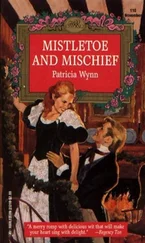Ed Mcbain - Mischief
Здесь есть возможность читать онлайн «Ed Mcbain - Mischief» весь текст электронной книги совершенно бесплатно (целиком полную версию без сокращений). В некоторых случаях можно слушать аудио, скачать через торрент в формате fb2 и присутствует краткое содержание. Жанр: Полицейский детектив, на английском языке. Описание произведения, (предисловие) а так же отзывы посетителей доступны на портале библиотеки ЛибКат.
- Название:Mischief
- Автор:
- Жанр:
- Год:неизвестен
- ISBN:нет данных
- Рейтинг книги:3 / 5. Голосов: 1
-
Избранное:Добавить в избранное
- Отзывы:
-
Ваша оценка:
- 60
- 1
- 2
- 3
- 4
- 5
Mischief: краткое содержание, описание и аннотация
Предлагаем к чтению аннотацию, описание, краткое содержание или предисловие (зависит от того, что написал сам автор книги «Mischief»). Если вы не нашли необходимую информацию о книге — напишите в комментариях, мы постараемся отыскать её.
Mischief — читать онлайн бесплатно полную книгу (весь текст) целиком
Ниже представлен текст книги, разбитый по страницам. Система сохранения места последней прочитанной страницы, позволяет с удобством читать онлайн бесплатно книгу «Mischief», без необходимости каждый раз заново искать на чём Вы остановились. Поставьте закладку, и сможете в любой момент перейти на страницу, на которой закончили чтение.
Интервал:
Закладка:
“If I told you, would you know?” he asked, and grinned into the rearview mirror.
“Tell me,” she said.
“You familiar with the city?”
“No,” she said. “Who are you?”
“Would you remember if I told you?” he said, and grinned into the mirror again.
“Do I know you? Are you my grandson?”
“You remember your grandson, huh?” he said.
“Buddy,” she said, and nodded.
“You remember Buddy, huh?”
“Or Ralph. Are you Ralph?”
“That’s a dog’s name, Ralph. Here, Ralph,” he said, and laughed aloud.
“You must be Buddy then,” she said.
“Whatever you say, Grandma. We’re almost there now, so you just take it easy, don’t trouble your head with anything at all. This is something good I’m doing for you, you’ll thank me later on, you’ll see.”
“Ralph wasn’t a dog,” she said.
“Here, Ralph,” he said, and laughed again.
“I think he drowned,” she said.
“Maybe so.”
“I wish I could remember things.”
“I wish I could forget things,” he said. “You don’t know how lucky you are. People who love you, who are willing to do this for you, make life comfortable for you, you don’t know how lucky, really.”
“i am lucky,” she said.
“I know, Grandma. What have I been telling you? I know you’re lucky.”
“I am.”
“Almost there now. I’ve got a nice blanket here on the seat beside me, I’ll wrap it around you later, keep you nice and warm. Spring’s never coming this year, is it?”
“Did I say good night to Polly?”
“I don’t remember.”
“ I’m the one who can’t remember,” she said, and began chuckling. He laughed with her. Together, as the car moved through the empty hours of the night, they laughed together in the dark.
The railroad station at two in the morning was deserted and dark except for a single light that burned inside the locked and empty waiting room. He had reconnoitered the station and he knew that the waiting room was locked from 10:30P .M. to 4:30A .M., fifteen minutes before the first morning train came through. He also knew there was a Mickey Mouse lock on the door—well, nothing to steal in there, why bother with anything fancier than a simple spring bolt? There were three cars parked in the lot adjacent to the station. He found a spot close to the waiting room, parked near the meter there, opened the driver’s side door, told her, “I’ll be right back,” and stepped out of the car. He debated whether he should put a quarter in the meter, and decided he’d better just in case some cop happened to cruise by while he was inside the waiting room. He deposited the quarter, twisted the knob, nodded, and then walked up the steps to the platform and around to where there was a door facing the tracks. There was another door on the other side of the waiting room, but it was visible from the street, and he didn’t want anyone spotting him while he worked the lock. Wouldn’t be any trains coming through this time of night, he’d checked the schedule. Swiftly, silently, he loided the lock with his American Express credit card, opened the door, and left it ajar.
She was sitting in the backseat where he’d left her. She was whimpering again. He opened the front door on the passenger side, took the plaid blanket from the seat, draped it over his arm, and then opened the door where she was sitting.
“Time to go, Grandma,” he said.
She didn’t say anything as he lifted her from the seat and into his arms, so frail, almost weightless, rested her head against his shoulder as he carried her up the steps to the platform, whimpering into his shoulder. He moved swiftly to where he’d left the door ajar, carried her into the waiting room, and gently kicked the door shut behind him.
“Nice and warm in here,” he said.
She kept whimpering.
“Nothing to be afraid of,” he said.
He carried her to the bench along the streetside wall of the room, the far end of the bench where there was a little nook formed by the armrest, and he lowered her to the seat and said, “You’ll be comfortable here. There’ll be a light burning all night long, nothing for you to be afraid of here, someone’ll be in around four, they’ll take good care of you, don’t worry.”
She just kept whimpering.
“So I’ll be running along now,” he said.
Whimpering.
“Goodbye, Grandma,” he said, and left her alone in the room with the dimly burning light.
OLD CHANCERY HOSPITAL—familiarly called the Chancery, or sometimes the Last Chancery—was on Old Chancery Road, three blocks from the Whitcomb Avenue Station on the Harb Valley line, which ran all the way upstate to Castleview. Two radio motor patrol cops from the Eight-Six had responded to a call from the stationmaster at 4:35 this morning. They had picked up the old lady and—on the orders of their sergeant—had dropped her off at the Chancery’s emergency room some ten minutes later. It was now five o’clock on this early Tuesday morning, the twenty-fourth of March. The doctors who stood around the bed in the old lady’s room on the third floor of the hospital were trying to elicit some answers that would get her off their hands and back where she belonged, wher ever that might be.
Granny dumping was not a new problem for them. It had started at the Chancery some ten years ago, when the first of the elderly victims had shown up sitting in a wheelchair outside the emergency room, an unsigned, hand-lettered note pinned to her chest:I AM ABIGAIL .I HAVE ALZHEIMER ’S DISEASE.PLEASE HELP ME . During that first year, five to ten elderly people were abandoned at the hospital each and every month, a trend that peaked some three years later, after which the number dropped to two or three a month.
“Do you know your name?” Frank Haggerty asked.
He was the hospital’s Chief of Staff, one of the two medical men who stood around the bed, a man some sixty-three years old with a mane of white hair, riveting blue eyes, and a skin prematurely wrinkled by years of indifferent exposure to the sun. With him in the old lady’s room were his E.R. Chief and his Director of Social Services. This was the sixth case of abandonment the hospital had experienced in the past month, up from four the month before. Granny dumping was back—with a vengeance. Haggerty couldn’t afford any more of these incidents; the city had cut its hospital budget by thirty-five percent last year and the Chancery was a city hospital. It was now working with a skeleton staff more appropriate to a clinic in Zagreb than to a hospital in one of the world’s largest and most influential cities.
“Ma’am?” he said. “Can you tell us your name?”
The old woman shook her head.
She’d been carrying no identification. All of the labels had been cut out of her clothes: the nightgown and robe she was wearing, the panties underneath those, even her diaper.
“Do you know where you live?” Max Elman asked.
The other doctor, E.R. Chief, forty-seven years old, brown eyes, black hair, dark complexion, looking more like one of the Indian residents working under him than he did an American Jew. His wife was a doctor, too, working at a hospital in Calm’s Point. The only way they really got to see each other was to retreat to the little farmhouse they’d bought in Maine; they particularly liked it during the winter months, go ask.
“With Polly,” the woman said.
“Who’s Polly?” the third man asked.
He was the only civilian in the room, even though, like the two others, his title was Doctor . Dr. Gregory Sloane, whose master’s had come from the USC School of Social Work, and whose doctorate in Social Medicine had come from Ramsey University, right here in the city. At thirty-eight, he was the youngest of the three men, twice divorced and going bald, a not-unrelated physical phenomenon; his hair had begun falling out when his first wife, Sheila, left him for a man who scouted ballplayers for a major-league team. He guessed that along about now, she’d be with him in some backwater town someplace, watching would-be stars shagging pop flies. Buck, his name was. The scout.
Читать дальшеИнтервал:
Закладка:
Похожие книги на «Mischief»
Представляем Вашему вниманию похожие книги на «Mischief» списком для выбора. Мы отобрали схожую по названию и смыслу литературу в надежде предоставить читателям больше вариантов отыскать новые, интересные, ещё непрочитанные произведения.
Обсуждение, отзывы о книге «Mischief» и просто собственные мнения читателей. Оставьте ваши комментарии, напишите, что Вы думаете о произведении, его смысле или главных героях. Укажите что конкретно понравилось, а что нет, и почему Вы так считаете.












